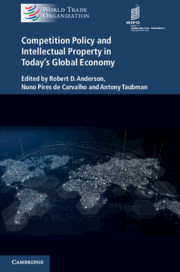Book contents
- Frontmatter
- Contents
- Tables
- Figures
- Boxes
- Contributors
- Preface
- Editorial Note
- 1 Introduction: Towards a Fresh Contribution to a Critical Policy Dialogue
- Part I Setting the Scene: Evolution of Key Principles and International Dialogue
- Part II Sharpening the Focus: Sectoral Perspectives
- Part III Deepening the Dialogue: Comparative and Jurisdictional Analyses
- Part IV Drawing the Lessons: Towards International Policy Coherence
- Index
12 - Patent Exhaustion and Seeds: Implications of the US Supreme Court Opinion in Bowman v. Monsanto (2013)
from Part II - Sharpening the Focus: Sectoral Perspectives
Published online by Cambridge University Press: 04 June 2021
- Frontmatter
- Contents
- Tables
- Figures
- Boxes
- Contributors
- Preface
- Editorial Note
- 1 Introduction: Towards a Fresh Contribution to a Critical Policy Dialogue
- Part I Setting the Scene: Evolution of Key Principles and International Dialogue
- Part II Sharpening the Focus: Sectoral Perspectives
- Part III Deepening the Dialogue: Comparative and Jurisdictional Analyses
- Part IV Drawing the Lessons: Towards International Policy Coherence
- Index
Summary
In Bowman v. Monsanto Co. et al. (Bowman/Monsanto) the United States Supreme Court on 13 May 2013 decided that the use by a purchaser of self-replicating soybeans for planting purposes amounts to a reproduction of new soybeans and is therefore not covered by patent exhaustion.1 A (product) patent according to Article 28.1(a) of the World Trade Organization (WTO) Agreement on Trade-Related Aspects of Intellectual Property Rights (TRIPS Agreement) confers a bundle of exclusive rights that can be broadly divided into two categories: (1) the right to prevent others from making the protected product; and (2) the right to prevent others from using the protected product (e.g., through sale, offering for sale, importing or any other use). The first authorized marketing of a protected product will exhaust the right holder’s exclusive rights related to the use of that particular product, so that the patent holder cannot prevent the purchaser from using the purchased article in any way they choose (‘exhaustion’ or ‘first sale’ doctrine).
- Type
- Chapter
- Information
- Publisher: Cambridge University PressPrint publication year: 2021

